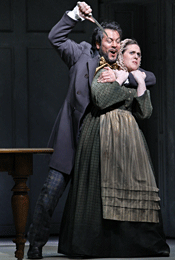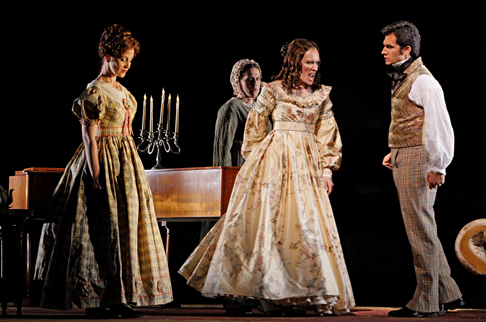![Sara Jakubiak as Catherine Earnshaw and Lee Poulis as Heathcliff [Photo by Michal Daniel courtesy of Minnesota Opera]](http://www.operatoday.com/0519.gif)
22 Apr 2011
Minnesota Opera rescues Herrmann work
There’s more Byron than Brontë in Bernard Herrmann’s 1951 Wuthering Heights.
English Touring Opera are delighted to announce a season of lyric monodramas to tour nationally from October to December. The season features music for solo singer and piano by Argento, Britten, Tippett and Shostakovich with a bold and inventive approach to making opera during social distancing.
This tenth of ten Live from London concerts was in fact a recorded live performance from California. It was no less enjoyable for that, and it was also uplifting to learn that this wasn’t in fact the ‘last’ LfL event that we will be able to enjoy, courtesy of VOCES8 and their fellow vocal ensembles (more below …).
Ever since Wigmore Hall announced their superb series of autumn concerts, all streamed live and available free of charge, I’d been looking forward to this song recital by Ian Bostridge and Imogen Cooper.
Although Stile Antico’s programme article for their Live from London recital introduced their selection from the many treasures of the English Renaissance in the context of the theological debates and upheavals of the Tudor and Elizabethan years, their performance was more evocative of private chamber music than of public liturgy.
Evidently, face masks don’t stifle appreciative “Bravo!”s. And, reducing audience numbers doesn’t lower the volume of such acclamations. For, the audience at Wigmore Hall gave soprano Elizabeth Llewellyn and pianist Simon Lepper a greatly deserved warm reception and hearty response following this lunchtime recital of late-Romantic song.
For this week’s Live from London vocal recital we moved from the home of VOCES8, St Anne and St Agnes in the City of London, to Kings Place, where The Sixteen - who have been associate artists at the venue for some time - presented a programme of music and words bound together by the theme of ‘reflection’.
'Such is your divine Disposation that both you excellently understand, and royally entertaine the Exercise of Musicke.’
‘And there was war in heaven: Michael and his angels fought against the dragon; and the dragon fought and his angels, And prevailed not; neither was their place found any more in heaven … that old serpent … Satan, which deceiveth the whole world: he was cast out into the earth, and his angels were cast out with him.’
There was never any doubt that the fifth of the twelve Met Stars Live in Concert broadcasts was going to be a palpably intense and vivid event, as well as a musically stunning and theatrically enervating experience.
‘Love’ was the theme for this Live from London performance by Apollo5. Given the complexity and diversity of that human emotion, and Apollo5’s reputation for versatility and diverse repertoire, ranging from Renaissance choral music to jazz, from contemporary classical works to popular song, it was no surprise that their programme spanned 500 years and several musical styles.
The Academy of St Martin in the Fields have titled their autumn series of eight concerts - which are taking place at 5pm and 7.30pm on two Saturdays each month at their home venue in Trafalgar Square, and being filmed for streaming the following Thursday - ‘re:connect’.
The London Symphony Orchestra opened their Autumn 2020 season with a homage to Oliver Knussen, who died at the age of 66 in July 2018. The programme traced a national musical lineage through the twentieth century, from Britten to Knussen, on to Mark-Anthony Turnage, and entwining the LSO and Rattle too.
With the Live from London digital vocal festival entering the second half of the series, the festival’s host, VOCES8, returned to their home at St Annes and St Agnes in the City of London to present a sequence of ‘Choral Dances’ - vocal music inspired by dance, embracing diverse genres from the Renaissance madrigal to swing jazz.
Just a few unison string wriggles from the opening of Mozart’s overture to Le nozze di Figaro are enough to make any opera-lover perch on the edge of their seat, in excited anticipation of the drama in music to come, so there could be no other curtain-raiser for this Gala Concert at the Royal Opera House, the latest instalment from ‘their House’ to ‘our houses’.
"Before the ending of the day, creator of all things, we pray that, with your accustomed mercy, you may watch over us."
The doors at The Metropolitan Opera will not open to live audiences until 2021 at the earliest, and the likelihood of normal operatic life resuming in cities around the world looks but a distant dream at present. But, while we may not be invited from our homes into the opera house for some time yet, with its free daily screenings of past productions and its pay-per-view Met Stars Live in Concert series, the Met continues to bring opera into our homes.
Music-making at this year’s Grange Festival Opera may have fallen silent in June and July, but the country house and extensive grounds of The Grange provided an ideal setting for a weekend of twelve specially conceived ‘promenade’ performances encompassing music and dance.
There’s a “slide of harmony” and “all the bones leave your body at that moment and you collapse to the floor, it’s so extraordinary.”
“Music for a while, shall all your cares beguile.”
The hum of bees rising from myriad scented blooms; gentle strains of birdsong; the cheerful chatter of picnickers beside a still lake; decorous thwacks of leather on willow; song and music floating through the warm evening air.
![Sara Jakubiak as Catherine Earnshaw and Lee Poulis as Heathcliff [Photo by Michal Daniel courtesy of Minnesota Opera]](http://www.operatoday.com/0519.gif)
There’s more Byron than Brontë in Bernard Herrmann’s 1951 Wuthering Heights.
That’s the case at least in the Minnesota Opera’s mesmerizing production of the largely forgotten work that opened at St. Paul’s Ordway Center on April 16. Herrmann’s score, completed in neighboring Minneapolis in 1951, is Romanticism writ large and saturated with Weltschmerz. And it all hurts so good!
With the help of librettist — and first wife — Lucille Fletcher Herrmann took much of the agony — but none of the angst — out of Emily Brontë’s 1847 novel. It is now a gentler story; they have softened the narrative line and made these forlorn credible in their passions — and their frustrations. The frame of the 19th-century social novel is still there, but these are people who would have a hard time building meaningful relationships even without the barriers of caste. To make this clear, MO assembled a great production team for a staging that — one hopes — will be seen on other companies.
Only someone with a heart of stone could resist loving Heathcliff as played by Lee Poulis, a Hollywood-handsome baritone who must be spectacular Don Giovanni, a role he has played at Sarasota Opera. He’s moody, to be sure, but Simonson does not place great emphasis on Heathcliff’s origins as a Gypsy foundling taken into the stuffy and inhibited Earnshaw family. And his problems are explained only in part by the social structure of the day. Poulis shrouds him in darkness — that’s what makes him fascinating to women (and at some point in the past to the elder Earnshaw who brought him home from Liverpool).
 Ben Wager as Hindley Earnshaw and Victoria Vargas as Nelly Dean
Ben Wager as Hindley Earnshaw and Victoria Vargas as Nelly Dean
It’s clear that Heathcliff is an unlikely candidate for an enduring Mr. Right in any era. He’s a complex guy — even when “sanitized” and gussied up in fancy duds. (How he comes to wealth so suddenly is left a secret by Brontë.) Thus it’s unavoidable that Catherine Earnshaw will love Heathcliff even after her marriage to colorless Edgar Litton, and that there’s no way out of this dilemma for her.
As Catherine Sara Jakubiac replaced Kelly Kaduce, originally slated to sing the role. Although she might not yet have Kaduce’s polish, Jakubiac may have an even richer and larger voice than Kaduce, the MO favorite who returns to the company as Madama Butterfly next season. Jakubiac made the long solo scene in which Catherine faces the hopelessness of her situation both gripping and engaging.
Equally touching was mezzo Adriana Zabala in writing the confessional letter that leaves no doubt about the miseries of her life with Hindley Earnshaw, sung by bass Ben Wager. Wager, on the other hand, somewhat overplays his addiction to alcohol in a scene that breaks with the overall resolute calm of Herrmann’s score.
 Adriana Zabala as Isabella Linton, Victoria Vargas as Nelly Dean, Sara Jakubiak as Catherine Earnshaw and Eric Margiore as Edgar Linton
Adriana Zabala as Isabella Linton, Victoria Vargas as Nelly Dean, Sara Jakubiak as Catherine Earnshaw and Eric Margiore as Edgar Linton
It’s a pity that as Edgar, Eric Margiore, the only tenor in the cast, has so little to sing. His one aria was lovingly delivered.
Although the part is small, bass-baritone Rodolfo Nieto brought one of the strongest voices in the cast to farmhand — and religious fanatic — Joseph.
One wishes one might have heard more of Jesse Blumberg — one of America’s great young baritones and a MO regular — than was allotted him as Mr. Lockwood in the opening scene.
Herrmann — most famous for such film scores as Citizen Cane and Psycho —otherwise spent his life largely as a conductor. It is not surprising, then, that Wuthering Heights is in concept orchestral, and in Michael Christie MO chose a conductor who knew how to make the most of this fact. Punctuated by many solo moments, Wuthering Heights as drama is essentially through-composed, in light of which Christie kept a sensitive finger on the pulse of the score.
Despite a staging at Portland in 1981 and a concert performance in France last summer, Wuthering Heights has never found its way into the repertory, because — allegedly — Herrmann was offended by any suggestion that he shorten the 3.5 hour work. That the MO performance lasted less than three hours seems to indicate that significant cuts were made in this production. Despite the length of the performance Christie kept attention riveted on the opera.
The sets and costumes by Neil Patel and Jane Greenwood, respectively, were predictable, Wendall K. Harrington brought visual enchantment to the production with the projections of which she now seems the national master. (She was equally successful with her contribution to Ricky Ian Gordon’s Rappahannock County, premiered at the Virginia Arts Festival on April 12.)
This production is part of Minnesota’s New Works Initiative, designed to focus attention on new or neglected work. A “first” for the company, the staging will be filmed in high definitive for digital distribution. (Confession: I set out to read Brontë’s novel for the first time in 65 years, but put it aside half way through. Herrmann’s version of the story is far better entertainment.) Dates for broadcasts and showing have not been set at this time.
Wes Blomster